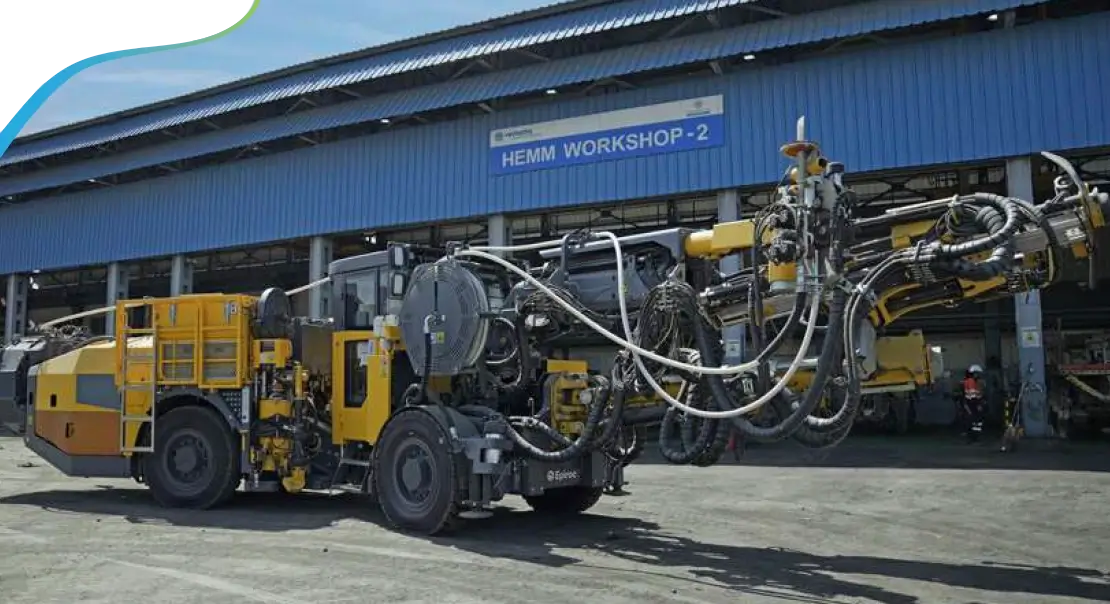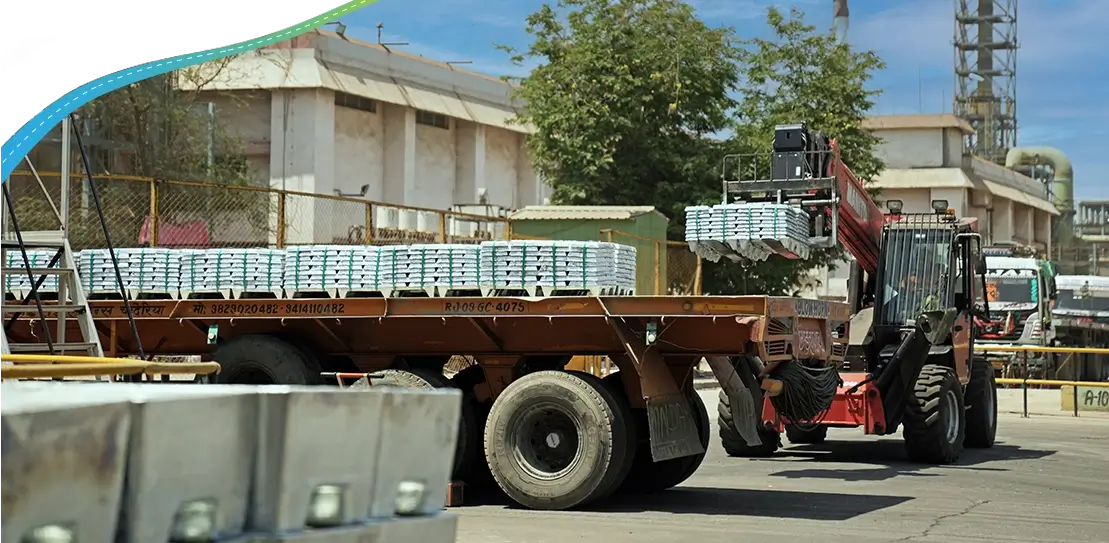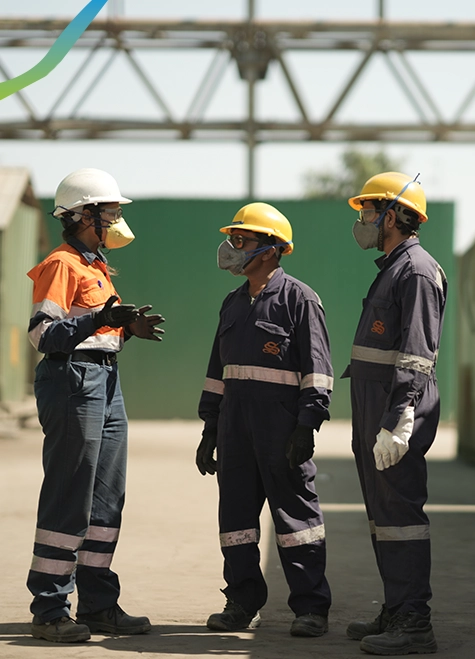Initiatives During the Fiscal
- Launched a vendor grievance portal for fair and unbiased resolution of disputes
- Conducted assessment for ~75% critical raw material suppliers under quality management framework
- Launched a cloud-based platform for system-enabled engagement and created a process for mutual assessment of BP’s performance to track critical contract performance
- A business process outsourcing partner engaged for spare procurement and managing inventory
- To adopt on sustainable practices, deployed eco-friendly transportation for inter-unit movement
- Developed five alternate vendors for critical commodities to reduce supply chain disruptions
- Successfully deployed surface electric vehicles for smelter operations through BPs and introduced new battery electric vehicles (BEV) in our underground (UG) mining operations
- Identified green fuel suppliers and initiated usage for mining fleet at Sindesar Khurd (SK) mine
In FY 2022-23, we purchased goods and services from 1,217 transacted vendors
Addressing ‘Priority’ Issues in Responsible Sourcing
As part of our responsible sourcing ethos, we are working continually on improving and delivering on our identified priorities. These priorities are indicative of future trends, potential business risks and new business opportunities for the Company. We have used the material assessment approach to identify material issues and their relevance to our supply chain on the basis of inputs from our BPs, shipping and logistics partners, industry associations, government and regulatory bodies, employees including the contract employees, as well as Supply Chain Community representatives. This has enabled us to take the necessary measures to ensure that all sourcing activities are done responsibly, with our BPs aligned with our priority issues and expectations.
Governance Structure: Supply Chain Management
We have established a three-tier governance structure for driving sustainability across the value chain. The second tier consists of the Supply Chain Community as part of the Executive Sustainability Committee, which reviews the progress on objectives taken by the Supply Chain Community on a monthly basis.
The Supply Chain Community is assigned the task of sustainability evaluation for our BPs with the aim of fostering the relationship, aligning our supply chain with our sustainability goals of 100% responsible sourcing by 2025, and collaborating for mutual growth and benefit. It focusses on effectively and positively building sustainability consciousness in our supply chain and continuing to address risks by identifying and tackling root causes.
The community is also tasked with reviewing compliances in accordance with the necessary guidelines of responsible sourcing and sustainable supply chain. It is authorised to update supply chain policies; classify BPs in different tiers according to country/commodity risk categories through a screening process; work towards increasing local procurement; create awareness among BPs on sustainable practices; source initiatives to reduce carbon footprint; and commission advisories or steering groups to provide focus or advice on creating a sustainable supply chain module.
Conforming Stringently to Responsible Supply Chain
We have in place a well-defined code of conduct for our suppliers. Refer to our policies on https://www.hzlindia. com/about-hzl/code-of-conduct/. The code represents our commitment to internationally recognised standards, including the core conventions of the International Labour Organisation (ILO), the United Nations’ Universal Declaration of Human Rights and prevalent industry standards.
It mainly covers:
Environment and Social Aspects
- Labour and Human Rights
- Health, Safety & Environmental Sustainability
- Climate Change
Governance Aspects
- Business Integrity
- Unethical Practices
- Grievance Redressal Mechanism
- Legal Compliance
- Zero Tolerance on Governance
- Insider Trading Prohibition
The supplier code of conduct is applicable to all our ‘suppliers’ globally and we ensure that they integrate the code in their supply chain and make their sub-contractors and suppliers too, aware of this code and its implications.
Integrating ESG into Responsible Supply Chain
At Hindustan Zinc, we have integrated ESG considerations into our supply chain process to help in better assessment of business risks and opportunities. Through collaboration, empowerment and engagement with our BPs, we have:
- Identified the key ESG and quality criteria in supply chain, and work closely with our supply chain partners on risk mitigation
- Implemented a structured framework for integration of ESG performance of supply chain partners in procurement decisions
- Developed a framework to support policies, procedures, and guidelines – from pre-check assessment to vendor onboarding until vendor performance evaluation
We perform BP audits to identify areas for improvement, or any alterations required to improve our process or upgrade working conditions. The audits also help in environmentally responsible management and ethical behaviour in our supply chain base and warehouses.
Introducing ESG Expectations
At Hindustan Zinc, we are committed to identifying, reducing and mitigating any negative impact of our business activities on people and environment. During FY 2022-23, we launched ESG Expectations for our BPs. The expectations supplement the requirements, guidelines and standards of conduct as encoded in other internal and external policies of the Company.
Our BP’s commitment to, and fulfilment of ESG Expectations is of paramount importance to Hindustan Zinc. We have thus applied for the recognition of ESG Expectations on a global basis and integrated them into the various practices involved in Hindustan Zinc’s qualification, evaluation, selection and management of BPs, as part of its contracting process. It is assessed as a factor when Hindustan Zinc considers awarding commercial opportunities.
As per this, BPs are required to provide information, complete training and perform other activities in connection with the ESG Expectations before, during, or after their supply of goods or performance of services for Hindustan Zinc’s requirements:
- BP to identify their ESG issues in line with Hindustan Zinc’s sustainability goals
- Identify risks and opportunities against ESG issues, identify and strategise solutions for the same, such as decarbonisation solutions, products which consume less energy/water
- Be 100% compliant with all regulatory requirements
- Make a commitment to various sustainable development goals like the Paris Agreement, net-zero target, Science-Based Targets initiative (SBTi), RE 100, EV 100, EP 100
ESG Expectations
Supply Chain Risk Management
Hindustan Zinc has established an effective internal management process to identify, assess and manage potential risks associated with its mineral supply chains.
Supply chain risk management covers the identification, assessment, ESG development programmes and mitigation (corrective action) of all operational and supply chain risks, throughout the lifecycle. This allows us to identify, assess and mitigate risks, and also to identify opportunities to add value and drive innovation. We implement risk management plans appropriate to the levels of risk, which includes economic, environmental, governance and social risks.
We identify critical/significant suppliers through a structured mechanism. Critical/significant suppliers include high-volume suppliers, suppliers of critical components and non-substitutable suppliers. A critical BP is one whose goods or services have significant impact upon our operations and/or sustainability, as well as a large footprint in one or more of our operations in terms of allocated personnel, equipment and resources, making replacement or substitution highly difficult without a detailed plan and a significant replacement process.
We have a set definition in place for identifying critical/ significant suppliers and service providers. This helps to ensure responsible sourcing of minerals and enables identification of inbound supply chain risks for the Company in cases when sourcing is done from conflict affected and high-risk areas (CAHRA).
We have in place a clearly defined process to identify and report red flags, along with the outcome of the risk assessment, to the senior management. Where red flags are identified, we undertake enhanced due diligence to map the factual circumstances of the presence of risks.
Risk Assessment and Corrective Actions
We are following a risk-based approach to determine whether BP sites need to undergo additional due diligence/ risk audits, which can include third party reviews/audits and/or certification through fully benchmarked standards. We segment our BPs based on the risk they pose to our business, which meets one or more of the following criteria:
- Strategic or business-critical for Hindustan Zinc, such as providing key components or services with few or no alternatives
- May have considerable social, environmental or economic impact
- Supply exclusively for Hindustan Zinc, using the Company’s know-how or process
- Produce mainly for Hindustan Zinc in a significant volume
- Considered to be major BP to Hindustan Zinc based on annual spend
- Single business partner dependency
- Operate in high-risk industry or operate or source from CAHRAs
- Quality of supply and services
Every year, we assess our qualified BPs on due diligence parameters through an independent third party. Further, on need basis we also conduct on-site assessment for detailed evaluation of quality practices, ESG and HSE practices.
In FY 2022-23, we conducted a total of 292 supplier risk assessments including on-site audits for all critical suppliers through an independent third party to verify the correct implementation of the quality and ESG methodology. This auditing system enables the inclusion of suppliers in line with the Company’s expectations. Thanks to the dual approach of desktop-cum-on-site assessment and awareness sessions, a greater number of suppliers have achieved good results during the year, while further corrective action from the few low-score suppliers has been sought for continual improvement.
Hindustan Zinc has a corrective action plan in place for the suppliers who do not qualify our assessment
In FY 2022-23, we conducted a total of 292 supplier risk assessments including on-site audits for all critical suppliers through an independent third party
Carbon Pricing in Procurement Decisions
We understand the importance of addressing Scope 3 emissions in addition to Scope 1 and Scope 2 in order to reach net-zero emissions. An industry specialist has been engaged to create greenhouse gas (GHG) emission capturing framework. We strive to take carbon emissions into account while making sourcing decisions in order to significantly reduce our Scope 3 emissions.
Business Partner Engagement
We measure BP performance by setting and tracking KPIs in our contracts with them. These KPIs relate to safety, human rights issues, child labour and environment-related compliances like water, climate change, emissions, etc., which are monitored on monthly/weekly/daily basis through corrective and preventive actions (CAPA). We also regularly undertake audits such as Contractor Field Safety Audit (CFSA) for all the service contractors. We provide human rights training to all our critical BPs and their employees. We have also conducted physical training sessions for our mining and smelter partners on performance and adaption of best practices. We conducted various connects with our critical supply vendors on Scope 3 emissions.
Local Procurement Commitment
We continue to increase our procurement spend on Rajasthan and Uttarakhand-based local state vendors, on a year-on-year basis.
Strategic Outlook – Way Forward
- Evaluating the supplier base on ESG metrics to identify risks and develop mitigation strategies
- Implementation of ISO 20400 sustainable procurement practices and green procurement framework
- Provide support and handholding BPs in terms of knowledge sharing, capacity building, technical assistance and other valuable resources on emissions control
- Awarding suppliers who excel in ESG parameters and ESG practices
- Incorporating water security KPIs for contracting and management of BPs
- Mapping tier-2 suppliers to assure complete supply chain quality
- Establish cloud-based digital platform to ensure tracking of sustainable procurement practices
Response to Vendor Grievances
At Hindustan Zinc, we are committed to responding swiftly to the issues and concerns of our BPs and address the same in a timely manner. For this, we have launched a web-based grievance reporting system for our BPs. It is our endeavour to encourage transparent communication while maintaining the trust and confidence of our BPs. We believe their feedback and inputs are valuable for enhancing supply chain transparency and realising our sustainability goals.
In addition to launching a grievance redressal platform for our BPs to share their feedback on ESG risks and other business aspects, we have covered 100% of our critical BPs through third party risk assessment. During FY 2022-23, Hindustan Zinc received a total of 76 grievances from its contractors, and all were resolved within the established timeframe, except one which was received towards the end of the fiscal year and resolution of which is underway.
In line with its goal of ‘net-zero carbon by 2050’ and its ESG commitment of ‘Transforming for Good’, Hindustan Zinc has inducted India’s first battery electric vehicles (BEVs) in underground mining operations.
‘NO’ to Single Use Plastic in Supply Chain
We aim to prohibit single use plastic items on our premises and thereby achieve the targeted zero usage across our value chain, in compliance with the latest Plastic Waste Management (Amendment) Rules, 2021 from the Ministry of Environment, Forest and Climate Change (MoEF&CC).
Beginning July 2022, we have prohibited both single use plastic items and use of plastic bags with thickness less than 100 microns. To ensure strict compliance, we carried out an email campaign with all our global suppliers from January 2023. Further, all our BPs are required to share an undertaking acknowledging the responsibility towards Hindustan Zinc’s ESG commitments with ‘no usage of single use plastics’ during packaging as a part of the tendering process. Instead, biodegradable packaging or use of plastic complying with established rules will be preferred.

Hindustan Zinc has established the use of liquefied natural gas (LNG) fleets, believing them to be the best technological solution towards sustainable transport. This brings significant benefits for the environment in terms of reduced noise pollution and emissions compared with diesel. In FY 2022-23, a successful trial was conducted for internal unit movement of concentrate through LNG vehicles. A long term engagement is now under finalisation. Hindustan Zinc is currently conducting trials at its plants for deployment of electric vehicles (EVs), as part of its efforts to integrate ESG into its operational logistics.

Read more about our Responsible Sourcing in our
Sustainability Review Report FY 2022-23
Case Study
Business Process Outsourcing for Spare Parts Procurement
We made the decision to improve the governance standards of the ecosystem by strengthening our supply chain through cooperation and long-term relationship development with selective BPs. These efforts will result in product innovation, increased productivity, and resource conservation. In order to do this, a BP was appointed to oversee the procurement process for maintenance, repair, and operation (MRO) items using the use-and-pay later method. The move was aimed at reduction in transactions to be carried out by the procurement team leading them to focus on improving processes and outcomes on the majority of the business. There was also the added benefit of reduction in spares inventory at Hindustan Zinc because of the focus the BP brought on the management of the MRO spares. This innovative model facilitated no supply chain disruption on spares, optimisation of inventory and credit enhancement, leading to efficient management of complex multi-site operations.
Intervention
- Adoption of tech-integration between multiple buying platforms done (Hindustan Zinc, original equipment manufacturers (OEMs), aggregators, etc.) and major OEMs/critical vendors were aligned with the aggregator to streamline the procurement process
Outcome
- With this strategic approach, Hindustan Zinc was able to cut transactional processes by lowering the number of active suppliers and purchase orders
- Process improvement (supported by various analytics) resulting in improved responsiveness and intelligence in planning/forecasting, staggered deliveries to optimise lot size and inventory value, touchless transactions, pre-empt availability of materials as per shutdown planning, and gain insights on improving procurement time, etc.
- Reduction in stores and spares inventory by 6% as compared with inventory levels at the end of FY 2021-22
At Hindustan Zinc, we
understand that the
commercial function has a
major role to play in creating
business value. We aim to
deliver this through volume
consolidation, complexity
reduction, process automation
and engaging with our partners
in meaningful relationships
which emphasise value
delivery, collaboration,
innovation, transparency,
and accountability. We
continue to drive ourselves
and our partners on ESG
and digitalisation as ways
of monitoring our impact on planet and performance.
Pallavi Wad
Chief Commercial Officer
SAVE LESSSAVE MORE



